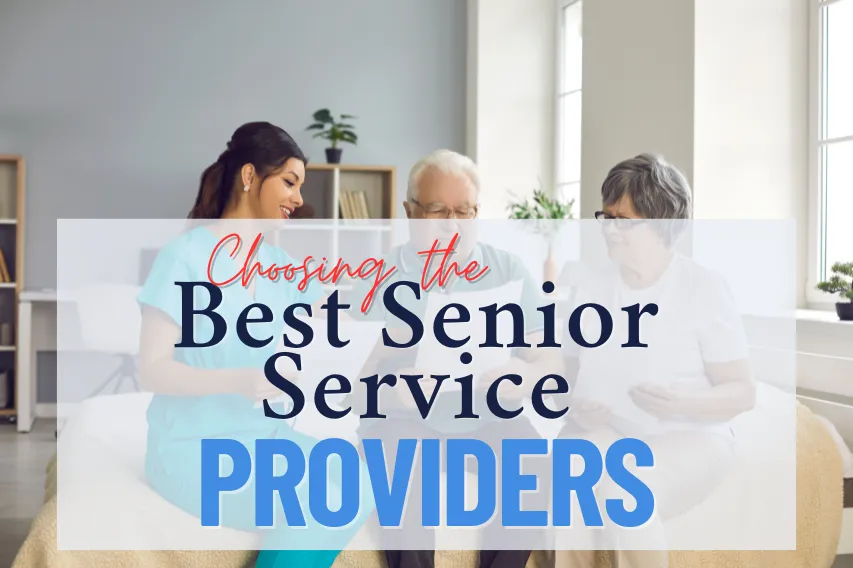
Selecting the Best Senior Service Providers | Expert Family Guide
How to Evaluate and Choose the Right Senior Service Providers
Choosing the right provider for services that support seniors—whether it’s moving help, in-home care, counseling, legal advice, or social programs—can feel overwhelming for families. By focusing on a few key criteria and asking the right questions, you can confidently select a provider who offers quality, compassion, and reliability. Below is a comprehensive guide that answers the questions families most often have when vetting senior service professionals.
1. Verify Credentials and Licensing
The very first step is ensuring any company or individual you consider holds the proper credentials. For moving and home care agencies, this means valid state licenses, liability insurance, and, when applicable, registration with federal bodies like the U.S. Department of Transportation. Counselors and therapists should be licensed in the state (LCSW, LPC, psychologist, or psychiatrist) and ideally accept Medicare. Elder law attorneys must hold an active NJ bar license and, if possible, certification as a specialist in elder law or membership in the National Academy of Elder Law Attorneys. Confirming these credentials protects you in case of accidents or malpractice and demonstrates that the provider adheres to industry standards.
2. Look for Specialized Experience
General service experience is valuable, but specialization in senior needs is crucial. Companies that market “senior moving,” “aging-in-place home care,” or “elder law” have usually invested in training their staff to address the unique physical, emotional, and logistical challenges that seniors face. Ask how long they have been serving older adults and whether they have handled cases similar to yours—such as moves into assisted living, memory-care support, or Medicaid planning. A provider with multiple years of focused senior experience will anticipate common hurdles and streamline your journey.
3. Research Reputation and References
Online reviews and word-of-mouth referrals offer real-world insights into a provider’s reliability, communication style, and overall performance. Check ratings on Google, Yelp, BBB, and specialized platforms like Caring.com for home care or EstateSales.org for liquidation firms. Reach out to local senior centers, elder-care attorneys, or your real estate agent for recommendations. Request at least two to three client references and ask about punctuality, respectfulness, and follow-through. A provider with consistently positive feedback and no unresolved complaints is much more likely to deliver on their promises.
4. Understand the Full Range of Services
Top-tier senior service providers often offer more than a single solution. Movers may partner with professional organizers to help with downsizing and floor-plan design. Home care agencies might provide both medical skilled nursing and non-medical companionship. Counseling practices could offer individual, group, or caregiver support sessions. Elder law firms frequently collaborate with care managers and financial planners. Seek out providers that can deliver a comprehensive, coordinated approach or refer you seamlessly to vetted partners. This “one-stop” strategy reduces your coordination burden and ensures continuity of care.
5. Insist on Transparent Pricing and Written Agreements
Financial clarity is critical. Always request a detailed, itemized written estimate following an in-home consultation. For movers, this should cover labor, materials, mileage, and any special handling fees. Home care contracts should spell out hourly rates, minimum shift requirements, and overtime policies. Legal and financial planners should provide retainer agreements with fee schedules. Avoid providers who quote vague “package rates” or demand large deposits without clear refund terms. A transparent contract not only prevents surprises but also serves as a roadmap for the services you’ll receive.
6. Prioritize Clear Communication and Customer Service
A high level of responsiveness and a single point of contact can make all the difference. Your provider should assign a dedicated coordinator—whether a move manager, care supervisor, therapist, or attorney—who returns calls promptly, sends regular updates, and is present for critical meetings or move days. This consistent communication demonstrates respect for your time and keeps everyone aligned on schedules, special instructions, and any last-minute adjustments.
7. Confirm Insurance and Value Protection
Standard liability policies often cover only a few cents per pound for damaged items, which is inadequate for high-value possessions or medical mishaps. Inquire about full-value protection options for movers (where the company covers the actual replacement cost) and professional liability coverage for home care and counseling agencies. If you’re working with attorneys or financial planners, verify errors-and-omissions insurance. Proper coverage ensures that, in the rare event something does go wrong, you have a clear path to fair compensation.
8. Seek Specialized Certifications and Affiliations
Beyond basic licensing, look for providers with industry endorsements. Senior Move Managers should be members of the National Association of Senior Move Managers (NASMM). Home care agencies may hold Home Care Pulse or Joint Commission accreditation. Therapists and counselors who specialize in geriatric care often carry additional certifications in grief, dementia, or family therapy. Legal professionals with a Certified Elder Law Attorney (CELA) credential have demonstrated advanced expertise. These affiliations indicate a commitment to ongoing education and ethical standards.
9. Ask the Right Questions
When interviewing finalists, consider these questions as part of your conversation:
“How do you tailor your services to meet the physical limitations and emotional needs of seniors?”
“Can you describe a challenging case you handled and how you resolved it?”
“What is your backup plan if key staff are unavailable due to illness or vacation?”
“How do you handle conflicts or dissatisfaction if they arise during service?”
“What is your process for involving family members in decision-making and updates?”
Their answers will reveal their problem-solving skills, flexibility, and genuine respect for family involvement.
10. Watch for Red Flags
Trust your instincts if you encounter any warning signs: refusal to provide a written contract, evasive answers about licensing or insurance, high-pressure sales tactics, demand for full payment upfront, or inconsistent estimates. Poor communication—such as delayed responses or vague promises—is another red flag that often foreshadows frustration down the line. A reputable provider values transparency and will welcome, rather than resist, your questions.
Conclusion
Selecting a senior service provider is as much about expertise as it is about empathy and trust. By focusing on licensing, specialized experience, reputation, comprehensive offerings, clear pricing, communication, proper insurance, and verified certifications, families can make informed choices that safeguard both their loved one’s well-being and their own peace of mind. Taking the time to research and ask the right questions will pay dividends in a smoother, more dignified transition for everyone involved.
Frequently Asked Questions
1. How far in advance should we schedule a senior service provider?
It’s best to begin your search as soon as the need becomes clear—ideally six to eight weeks before your desired start date. Many reputable companies book up quickly, especially during peak moving seasons or at month’s end. Starting early gives you time to request multiple in-home consultations, compare detailed estimates, and involve your loved one in choosing the right provider without pressure. If you wait until the last minute, you may have to settle for whoever is available rather than the best fit.
2. What should we expect to pay, and how do we budget for these services?
Costs vary depending on the scope of work, the provider’s expertise, and your location. Moving and estate-sale companies typically charge a percentage of the total sale or a per-hour rate for packing and labor, while home care agencies bill hourly with a minimum-shift requirement. Elder law attorneys and financial planners may use flat fees, hourly rates, or retainers. Ask for a written estimate outlining all fees—labor, materials, mileage, insurance, and any potential add-ons. Build in a 10–15% cushion for unexpected needs, such as extra packing time or additional clean-out services, so you aren’t caught off guard by last-minute costs.
3. What is the difference between an employee and an independent contractor, and why does it matter?
When caregivers or movers are W-2 employees of a licensed agency, the agency oversees training, background checks, insurance, and supervision. This structure tends to offer greater reliability and legal protections if something goes wrong. Independent contractors, on the other hand, may set their own hours and rates, but you assume responsibility for verifying their credentials and arranging for any necessary insurance. For senior-focused services, working with agencies that employ staff directly usually provides more consistent quality and accountability.
4. What happens if the service doesn’t meet our expectations?
Reputable providers stand behind their work with satisfaction guarantees or clear dispute-resolution policies. Before signing any agreement, review the contract’s cancellation and refund terms. Ask how they handle complaints—will you speak directly with an owner, manager, or customer-service line? A trustworthy company will welcome feedback and offer timely remedies, whether that means sending a different caregiver, re-packing items, or adjusting pricing. If a provider is reluctant to put satisfaction policies in writing, it may be a sign to look elsewhere.
5. How do we keep our loved one involved without overwhelming them?
Involving seniors in important decisions respects their autonomy and eases anxiety. Give them choice points—such as selecting which items stay or go, choosing the day of the initial consultation, or reviewing the final floor plan—while letting professionals handle the logistical details. Hold brief planning meetings rather than long sit-downs, and provide clear summaries afterward. Encourage them to ask questions, but reassure them that the heavy lifting and coordination are in expert hands. This balanced approach preserves dignity and ensures buy-in while shielding seniors from stress.


